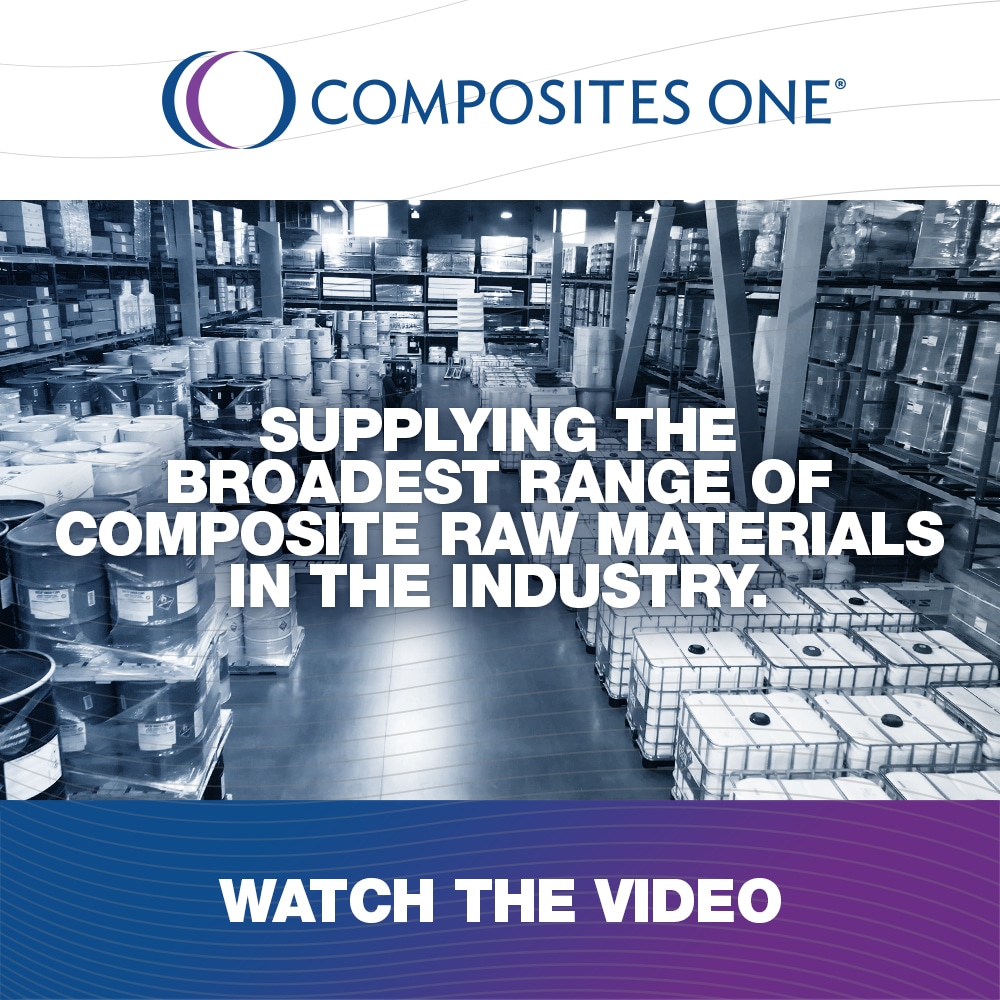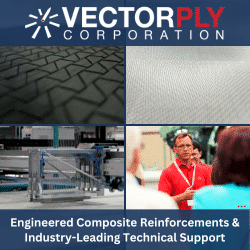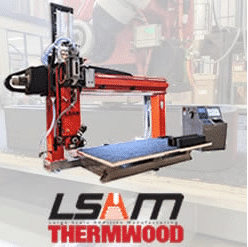

A View Toward Composites Evolution
Michael Gromacki, CEO of McClarin Composites, jokes that his involvement with ACMA began with a dumpster fire.
“In 1997, I gave my first presentation with ACMA – then called the Composites Fabricators Association – on the safe handling of scrap resin,” says Gromacki, who began a two-year term as chair of ACMA’s Board of Directors in July. “Employees at industry companies were polymerizing and discarding scrap resin in dumpsters, which can later start a fire. It was a high-risk practice without common guidelines, resulting in several shop fires.”
At the time, Gromacki was a young engineer working in the resins division of TOTAL, known in North America as Cook Composites and Polymers (CCP). He anticipated a low turnout for his presentation, which was scheduled for the late afternoon on the last day of the conference. But the room was packed.
“That showed me that the industry really cared about safety, preventing loss and doing things properly,” recalls Gromacki. “The experience was great, and it began a lifelong engagement with ACMA.”
An Early Interest in Advanced Materials
Gromacki grew up in Racine, Wis., on the shores of Lake Michigan approximately 30 miles south of Milwaukee. He attended the University of Wisconsin – Madison, where he majored in chemical engineering and competed in football and rowing.
As a boy, Gromacki was drawn to science. Technological advancements of the 1980s sparked his interest in material science.
“You had the development of the space shuttle and superconductive materials, prosthetics and the artificial heart,” says Gromacki. “They were all made possible through advanced materials, including composites and ceramics.”
In high school, he participated in Junior Achievement™ programs, where an entrepreneurial engineer and local business owner who volunteered with the organization influenced his decision to enter the field. Another key person who inspired Gromacki was his second cousin, Alan Kulwicki, a driver on the NASCAR circuit with a degree in mechanical engineering and eventual NASCAR Rookie of the Year, Cup Champion and Hall of Fame inductee.
After graduating from college, Gromacki worked in engineering consulting firms for approximately five years, most notably URS Corp., now part of AECOM. “I was exposed to a whole universe of opportunities,” he says. “As an engineer in a large firm you could work in various industries – pharmaceuticals, paper, refining, specialty chemicals and others.”
In 1997, Gromacki joined a consulting firm client, TOTAL at CCP, marking the start of his career in the composites industry.
A Career in Composites
Gromacki held several positions within TOTAL, including manufacturing director and vice president of engineering and loss control in the resins division. He joined Dixie Chemical Co. as vice president of operations in 2009, then served as president for three years. Following a two-year stint as director of global wind and composites systems at Olin Corp., he was appointed CEO of McClarin Composites in 2022.
Throughout his career, Gromacki has gained a reputation as an insightful leader with a strong technical background. Jennifer Agnew Scott, a sales executive with Olin, praises his ability to assess situations and take actions that drive positive outcomes – even in the most trying times. Gromacki served as her business leader at Olin from 2020 to 2022.
“During extreme weather events and the COVID pandemic that led to uncertainty and supply chain disruptions globally, Mike instituted approaches that aligned with the company’s mission – zero disruptions,” says Agnew Scott. “I felt empowered and accountable, and, most importantly, I felt free to bring my authentic self in every interaction with Mike, even when we disagreed.”
Agnew Scott also believes that Gromacki’s experience with several companies and in a variety of roles has given him “a unique perspective on every aspect of the industry, from technology, policy and talent acquisition to employee empowerment, engagement and C-suite expectations.”
A Focus on Automation
Gromacki brought a quarter century of experience in the composites industry to McClarin Composites, a 72-year-old company with more than 300 employees in three locations: Oklahoma City, Hanover, Pa., and Wapato, Wash.
“I was attracted to McClarin because it had great locations, a legacy in plastic thermoforming and composites, and a lot of potential to implement machine-driven processes,” he says. “That’s a solid platform to drive innovation.”
Gromacki believes automated solutions can help the composites industry address one of its biggest concerns. “Traditional open mold operations are labor intensive, and one of the main challenges that manufacturing faces right now is labor availability,” he says. “We have to change the paradigm.”
McClarin is implementing automated solutions from GrayMatter Robotics to handle labor intensive and arduous tasks, such as sanding, polishing, buffing and grinding. GrayMatter’s robotic cells rapidly scan parts, then use autonomous planning software to build a model that ensures accurate placement of the part and correct use of the tool (grinder, sander, etc.). The system also monitors the cell operation throughout the process to make sure it’s functioning properly.
Under Gromacki’s leadership, McClarin has executed a joint agreement with ExxonMobil to grow high-speed RTM molding applications for Proxxima™ polyolefin thermoset resins as an alternative to prepreg and sheet molding compound. He anticipates the new RTM line will be operational in 4Q 2025.
A Servant Leader
Gromacki was drawn to ACMA after his positive experience as a conference speaker.
“I was hooked on the notion that ACMA was supportive of new people, and you get the most value if you get involved and keep abreast of the different businesses and technologies,” he says.
For many years, Gromacki served on and chaired the association’s Loss Control Committee, part of the Resins Managers Council. The committee focused on process safety for production of unsaturated resins, particularly dicyclopentadiene-based resins. Gromacki and his peers advocated for safe and efficient production of resins with lower styrene content that were compliant with hazardous air pollutant (HAP) limits under then new Maximum Achievable Control Technology (MACT) standards.
“It was a great example of how companies – even competitors – can work together in a pre-competitive environment to help the industry,” he says.
Gromacki has served on ACMA’s Board of Directors while working for three companies: Dixie Chemical, Olin and McClarin Composites. Through the years, he chaired several committees, including the Technical, Membership, Finance and Executive Committees.
“Mike understands how the board works and what ACMA’s issues and opportunities are,” says Leon Garoufalis, president and CEO of Composites One and former vice chair of ACMA’s Board of Directors. “He brings a servant leader mentality to this position, which is required for the type of collaboration necessary to move ACMA and the industry forward.”
One of the critical topics facing the industry as Gromacki begins his tenure as ACMA chair is sustainability. Member companies are increasingly hearing from customers asking about the environmental impact of their products.
“There is a lot of sensitivity about the carbon footprint of parts, the equipment in use and end-of-life for equipment in the segments we target at McClarin, such as mass transit and heavy trucking,” says Gromacki. “These topics weren’t a priority 25 years ago, but they’ve become urgent. And large companies are requiring that you clear their supplier thresholds.”
ACMA has responded by developing the LCA + EPD Generator to prepare reliable, cost-effective environmental product declarations for their products and materials.
Other priorities for ACMA under Gromacki’s leadership include keeping members abreast of trade policies and tariffs and their effect on the industry, as well as ramping up workforce development efforts. “When you face challenges that you are trying to navigate, your association is your closest ally,” says Gromacki. “We strive as a board to work on issues that have the most impact for ACMA members.”

SUBSCRIBE TO CM MAGAZINE
Composites Manufacturing Magazine is the official publication of the American Composites Manufacturers Association. Subscribe to get a free annual subscription to Composites Manufacturing Magazine and receive composites industry insights you can’t get anywhere else.











